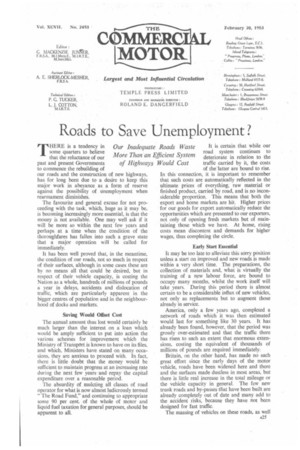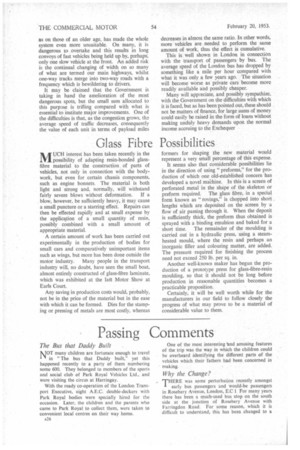Roads to Save Unemployment?
Page 27

Page 28

If you've noticed an error in this article please click here to report it so we can fix it.
Our Inadequat e Roads Waste More Than an Efficient System of Highways Would Cost
THERE is a tendency in some quarters to believe that the reluctance of our past and present Governments to commence the rebuilding of our roads and the construction of new highways, has for long been due to a desire to keep this major work in abeyance as a form of reserve against the possibility of unemployment when rearmament diminishes.
The favourite and general excuse for not proceeding with the task, which, huge as it may be, is becoming increasingly more essential, is that the money is not available. One may well ask if it will be more so within the next few years and perhaps at a time when the condition of the thoroughfares has fallen into such a grave state that a major operation will be called for immediately.
It has been well proved that, in the meantime, the condition of our roads, not so much in respect of their surfaces, although in some cases these are by no means all that could be desired, but in respect of their vehicle capacity, is costing the Nation as a whole, hundreds of millions of pounds a year in delays, accidents and dislocation of traffic, which are particularly apparent in the bigger centres of population and in the neighbourhood of docks and markets.
Saving Would Offset Cost The annual amount thus lost would certainly be much larger than the interest on a loan which would be amply sufficient to put into action the various schemes for improvement which the Ministry of Transport is known to have on its files, and which, Ministers have stated on many occasions, they are anxious to proceed with. In fact, there is little doubt that the money would be sufficient to maintain progress at an increasing rate during the next few years and repay the capital expenditure over a reasonable period.
The absurdity of mulcting all classes of road operator for what is now almost ludicrously termed "The Road Fund," and continuing to appropriate some 90 per cent. of the whole of motor and liquid fuel taxation for general purposes, should be apparent to all. It is certain that while our road system continues to deteriorate in relation to the traffic carried by it, the COSLS of the latter are bound to rise. In this connection, it is important to remember that such costs are automatically reflected in the ultimate prices of everything, raw material or finished product, carried by road, and is no inconsiderable proportion. This means that both the export and home markets are hit. Higher prices for our goods for export automatically reduce the opportunities which are presented to our exporters, not only of opening fresh markets but of maintaining those which we have. At home, rising costs mean discontent and demands for higher wages, thus completing the circle.
Early Start Essential It may be too late to alleviate this sorry position unless a start on improved and new roads is made within a very short time. The preparations, the collection of materials and, what is virtually the training of a new labour force, are bound to occupy many months, whilst the work itself will take years. During this period there is almost certain to be a considerable influx of new vehicles, not only as replacements but to augment those already in service.
America, only a few years ago, completed a network of roads which it was then estimated would last for something like 30 years. It has already been found, however, that the period was grossly over-estimated and that the traffic there has risen to such an extent that enormous extensions, costing the equivalent of thousands of millions of pounds are required immediately.
Britain, on the other hand, has made no such great effort since the early days of the motor vehicle, roads have been widened here and there and the surfaces made dustless in most areas, but there is little real increase in the total mileage or the vehicle capacity in general. The few new trunk roads and by-passes that have been built are already completely out of date and many add to the accident risks, because they have not been designed for fast traffic.
The massing of vehicles on these roads, as well A25 as on those of an older age, has made the whole system even more unsuitable. On many, it is dangerous to .overtake and this results in long convoys of fast vehicles being held up by, perhaps: only one slow vehicle at the front. An added risk is the continual changing of width on so many of what are termed our main highways, whilst one-way tracks merge into two-way roads with a frequency which is bewildering to drivers.
It may be claimed that the Government is taking in hand the amelioration of the most dangerous spots, but the small sum allocated to this purpose is trifling compared with what is essential to institute major improvements. One of the difficulties is that, as the congestion grows, the average speed of traffic decreases, consequently the value of each unit in terms of payload miles decreases in almost the same ratio. In other words, more vehicles are needed to perform the same amount of work, thus the effect is cumulative.
This is well shown in London in connection with the transport of passengers by bus. The average speed of the London bus has dropped by something like a mile per hour compared with what it was only a few years ago. The situation will become worse as private cars become more readily available and possibly cheaper.
Many will appreciate, and possibly sympathize. with the Government on the difficulties with which it is faced, but as has been pointed out, these should not be matters of finance, for large sums of money could easily be raised in the form of loans Without making unduly heavy demands upon the normal income accruing to the Exchequer




















































































